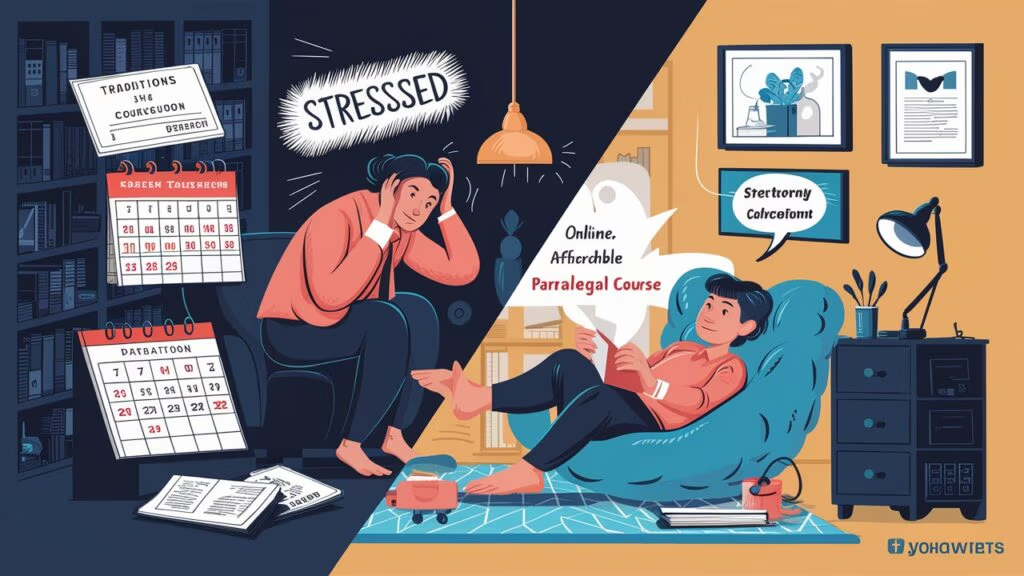Do you want to become a paralegal and have a rewarding career? Then allow me to let you in on a little secret: to be a paralegal, you don’t need a degree. Today, I’ll break down how to become a paralegal in just 6 months without spending thousands of dollars on your education. That’s right; it’s possible to start your career without spending years driving to school. In this video, I’ll give you a step-by-step roadmap on how you can do just that.

What You Will Learn
With this radical new approach, you can be job-ready as a paralegal with everything you need in just a few months. Here’s what I’ll cover today:
- How to get top-notch paralegal training without big price tags or student debt.
- How to crush the competition and set yourself apart as a paralegal.
- How to get real-life work experience to build your resume even before you start working.
- My simple three-step process to be job-ready as a certified paralegal in under 6 months.
Why Become a Paralegal?
Paralegals are in demand, and according to the BLS, close to 40,000 jobs are projected each year for paralegals. It’s a great career and is often seen as the ideal gateway to the high-paying legal industry, but without needing 7 years of school to be a lawyer. So what are the steps you need to take to start your paralegal career? Essentially, there are three steps:
- Education: You need the right training as a paralegal, and this is the most important step that sets the foundation for your entire career. Training is where I see people make the most mistakes because of these mistakes they spend too much time and money on their education. Today, I’ll cover these common mistakes and what you can do differently to start your career faster.
- Certification: You need to get certified as a paralegal. When you’re starting your career, you need the Certified Paralegal certification issued by NALA.
- Experience: Finally, if you have some work experience under your belt working in a local law firm, that can be huge. Paralegals starting their careers often have little knowledge about local court procedures and regulations, so if you can demonstrate knowledge about these local procedures, that can really set you apart.
The Importance of Certification
These are the three simple steps that you need to take to become a paralegal. Now, before we dive in any further, in my experience, there is one thing that could give you the edge over your peers, especially as an entry-level paralegal, and that’s being a certified paralegal. If you’re certified as a paralegal, that could be huge, and the NALA certification is typically regarded as the gold standard.
But what does it mean to be certified, and how do you obtain the certification? To do that, you have to clear an exam, and once you can do that, you’re a certified paralegal, and you can put the CP title after your name. NALA is a nationally recognized body, and its certification holds value across the US. Holding this certification shows employers that you can be trusted to perform the duties of a paralegal, and it also reflects your dedication to the career.
If you walk into your job interview as a certified paralegal, you’re going in there all guns blazing, so I highly recommend sitting for your exam and getting that NALA certification.

Preparing for the Certification Exam
Now the question is, how do you prepare for the exam? Well, the right training program will not only prepare you for a career as a paralegal, but it also gives you the skills to crush that certification exam. The key here is to enroll in the right training program. Your education is hands down the most important step towards your journey to become a paralegal. Unfortunately, so many adults make the wrong choice, and as a result, they spend thousands of dollars on their education, go into student debt, and spend years driving to classes, wasting both time and money.
Read More: How To Become a Modern Librarian
The Problem with Traditional Training Programs
So why does that happen? Typically, to get trained as a paralegal, here are your options:
- Enrolling in a full-time associate degree program.
- Certificate programs at a local community college.
These are the options that are generally recommended, and you’ve probably considered these yourself. Sadly, for modern busy adults who want to start their careers faster and don’t want to go into debt, these traditional programs are simply not practical and have some major flaws.
The Flaws of Traditional Programs
Before discussing these flaws, let’s talk about the good stuff. I mean, there must be some good things about them too, right? Well, yes, when you complete a full-time program (degree or certification), you get a university certificate, and in my opinion, that is the best thing for your resume.
Here’s the deal: in the corporate and legal world, people put a large emphasis on where you went to school. That’s why lawyers always want to go to the best ones, and as a paralegal, if you have a university certificate for training, that could tip the scales in your favor as well. And with these full-time programs, you do get that university certificate.
Sadly, this is where the benefits end and these full-time programs are just not practical. Now here’s why:
- Big Enrollment Fees: For a degree program, the tuition can be upwards of $115,000, and for a certificate program, the enrollment fee can range from $7,000 to $112,000. That’s a big price tag. To afford such a high cost, you may likely need student loans. The process for applying for these loans is time-consuming and challenging, plus starting your career under the burden of student debt isn’t a smart choice. In a survey conducted by Morgan Stanley, 37% of respondents said they typically have to cut their spending in other areas just to make their student loan payments. Do you want that?
- Long Course Duration: A degree program takes 2 years to complete, while a certificate program will take a year to complete. Either way, that’s a lot of time spent in a classroom. One thing that I hate about these traditional programs is there are so many classes that have nothing to do with being a paralegal. That’s just time wasted, and you’re forced to learn about subjects that you’ll never need. In an on-campus college program, you might have to take classes in humanities or science or history or basket weaving for that matter—it just doesn’t make sense.
- Fixed Schedules: With these programs, you have to drive to campus multiple times a week. That’s a lot of time when you’re attending classes on a schedule. As adults, we’re busy—we have responsibilities, kids’ schedules, etc. It can be challenging to stop everything in our lives and attend weekly scheduled classes. Things can come up, and you might just need to miss a class. If you fall behind too much, you’ll need to wait a full year before taking the class again. It’s a vicious cycle with these programs, and it prevents people from finishing their training.
- Hidden Costs: Now, the big costs I mentioned earlier were just the tuition. There are hidden costs on top of that. When you take into account the cost of traveling to these classes, gas, parking permits, books, and training materials, the figure just goes up. Your education can get really expensive. Ultimately, long course duration, big price tags, hidden costs, and fixed schedules—these are the things that prove to be deal breakers.

The Modern Approach to Paralegal Training
The modern corporate and legal structure is all about efficiency. Everyone wants to get things done faster than the competition, but the sad reality is the education system is still set in its old ways. Tedious application forms, soaring tuition costs, long course durations, and inefficient on-campus classroom learning—everyone wants an alternative.
Now, if you’ve stayed this far, then you’re serious about becoming a paralegal, and you want to enroll in the right training program. Well, what if you could get top-notch paralegal training minus all the problems we talked about?
Introducing Preppy’s Paralegal Certification Program
A few years ago, I realized that traditional training programs have these critical flaws. So it got me thinking, if I had the luxury of creating the perfect program for paralegals, what would it entail? Well, the first thing is that it should be online and self-paced. The convenience of an online program and a self-paced program is unbeatable. Scheduled classes don’t make sense anymore, and you should be able to learn at your own pace from the comfort of your home.
The second thing is the program needs to be faster. You don’t need to study for 2 years to become a paralegal. Ideally, your paralegal training should not take more than 6 months.
Thirdly, and this is an important factor, the program needs to be affordable and with an accredited university. You need a certification with a university’s name on it, and the program needs to cost less than $3,000.
Finally, the program needs to come with work experience, too. When you graduate, you need to have some work experience under your belt as well. That’s what I wanted in the ideal paralegal program to become a paralegal.
So what did I do next? Well, I went out and created this program myself, and today, we call it Preppy’s Paralegal Certification Program. Let me tell you more about this program.

More Info:
The program is 100% online, so you can learn at your own pace from the comfort of your home. It’s certified by an accredited university, and we even help you gain work experience so that you’re job-ready when you graduate. The best part? The entire program costs less than $3,000. This is the program that I created because there was nothing like it available.
So if you’re ready to become a paralegal, this is where you need to start. Click here to learn more about Preppy’s Paralegal Certification Program and kickstart your career today.




